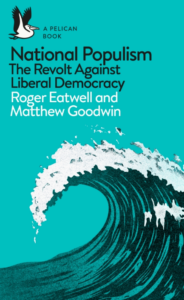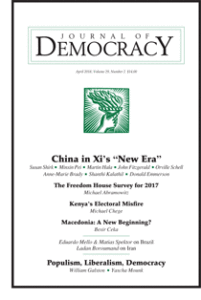 National populist parties share a common approach and program, argues Matthew Goodwin, professor of politics at the University of Kent and senior visiting fellow at Chatham House. They seek to advance what they see as the interests and culture of their country’s ethno-cultural majority; they present themselves as giving voice to people who feel neglected, even held in contempt, by distant, self-serving liberal elites. But the roots of the populist revolt are widely misunderstood, he writes for The Wall Street Journal.
National populist parties share a common approach and program, argues Matthew Goodwin, professor of politics at the University of Kent and senior visiting fellow at Chatham House. They seek to advance what they see as the interests and culture of their country’s ethno-cultural majority; they present themselves as giving voice to people who feel neglected, even held in contempt, by distant, self-serving liberal elites. But the roots of the populist revolt are widely misunderstood, he writes for The Wall Street Journal.
To make sense of what’s really going on in the rise of national populism, we must consider several wider currents now colliding in European politics, says Goodwin, the co-author, with Roger Eatwell, of “National Populism: The Revolt Against Liberal Democracy.” Four are key:
- The first is distrust, generated by political institutions that have become less representative of the groups that are most likely to cast a vote for national populists: people without degrees and the working class. There are more women and ethnic minorities in our legislatures than ever before, which should be celebrated, but there have never been fewer nongraduates and people from blue-collar backgrounds….
- A second key current is destruction: widespread fears that national identities, cultures and ways of life are slipping away. When eight in 10 Trump voters support building a wall on the southern border, or three in four Brexit voters, worried about how immigration is changing Britain, voted to “take back control,” they knew what they were supporting….
 Third, national populists are tapping into worries over deprivation—not objective economic loss, but relative deprivation. Tens of millions in Europe feel that their ethno-cultural group is being left behind relative to others, while liberal politicians, media and celebrities devote far more attention and status to favored migrants, minorities and other newcomers. This is fused with a profound sense of pessimism about the future, a firm belief that things will get worse, that their group will fall further behind and their children will have a worse life than their own….
Third, national populists are tapping into worries over deprivation—not objective economic loss, but relative deprivation. Tens of millions in Europe feel that their ethno-cultural group is being left behind relative to others, while liberal politicians, media and celebrities devote far more attention and status to favored migrants, minorities and other newcomers. This is fused with a profound sense of pessimism about the future, a firm belief that things will get worse, that their group will fall further behind and their children will have a worse life than their own….- The final factor in the national populist upsurge is dealignment. Historic tribal loyalties to the older parties are breaking down across much of the West. Europe’s classic era of strong partisan identification, in the mid-to-late 20th century, is today quickly making way for new alignments and electorates that are more fluid and volatile and thus less predictable….







